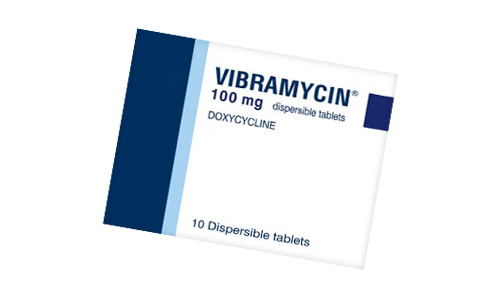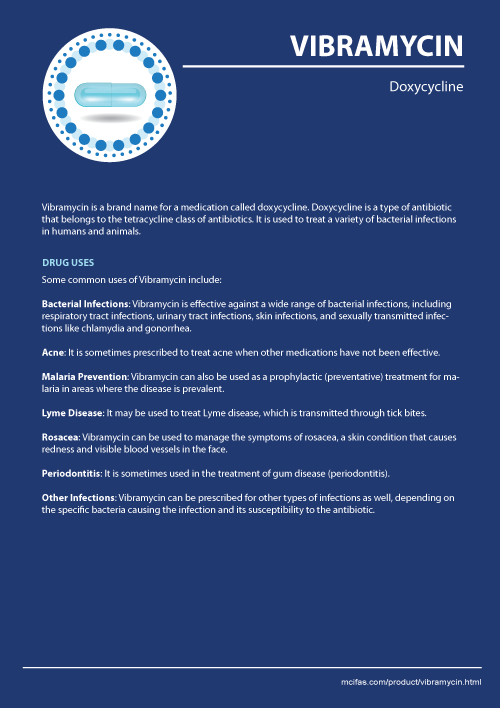Vibramycin Prescribing Information
Vibramycin is a brand name for a medication called doxycycline. Doxycycline is a type of antibiotic that belongs to the tetracycline class of antibiotics. It is used to treat a variety of bacterial infections in humans and animals.

Uses of Vibramycin
Some common uses of Vibramycin include:
- Bacterial Infections: Antibiotic is effective against a wide range of bacterial infections, including respiratory tract infections, urinary tract infections, skin infections, and sexually transmitted infections like chlamydia and gonorrhea.
- Acne: It is sometimes prescribed to treat acne when other medications have not been effective.
- Malaria Prevention: Doxycycline can also be used as a prophylactic (preventative) treatment for malaria in areas where the disease is prevalent.
- Lyme Disease: It may be used to treat Lyme disease, which is transmitted through tick bites.
- Rosacea: Vibramycin can be used to manage the symptoms of rosacea, a skin condition that causes redness and visible blood vessels in the face.
- Periodontitis: It is sometimes used in the treatment of gum disease (periodontitis).
- Other Infections: Vibramycin can be prescribed for other types of infections as well, depending on the specific bacteria causing the infection and its susceptibility to the antibiotic.
Dosage
The dosage of Vibramycin can vary depending on the type and severity of the infection being treated. Here are some general dosing guidelines:
- For Adult Infections: The typical starting dose for most adult infections is 100 milligrams (mg) of Vibramycin taken twice a day (totaling 200 mg per day). After the initial dose, the maintenance dose is usually 100 mg once a day.
- For Severe Infections: In cases of severe infections the initial dose may be higher, such as 200 mg on the first day, followed by a maintenance dose of 100 mg per day.
- For Acne: When used to treat acne, the usual dosage is lower, often starting with 50 mg to 100 mg once a day.
- For Malaria Prophylaxis: The dosing regimen for malaria prevention can vary based on the specific. It's usually taken once daily, starting one to two days before entering a malaria-prone area and continuing for a few weeks after leaving.
- For Pediatric Dosing: Pediatric dosages depend on the child's age and weight, and they are typically lower than adult dosages.
Always take Vibramycin with a full glass of water and follow any specific instructions provided with your prescription. It's essential to complete the full course of treatment even if your symptoms improve before finishing the medication. Skipping doses or stopping the medication early can lead to treatment failure and antibiotic resistance.
Side Effects of Vibramycin
Vibramycin can cause various side effects, and not everyone will experience them. The severity and type of side effects can vary from person to person. Common side effects include:
- Gastrointestinal Upset: This is one of the most common side effects and may include nausea, vomiting, diarrhea, or abdominal pain. Taking capsules with food or a full glass of water can help reduce the likelihood of stomach upset.
- Esophagitis: Antibiotic can sometimes irritate the esophagus, leading to a condition called esophagitis. To minimize this risk, it's essential to take the medication with plenty of water and remain upright (sitting or standing) for at least 30 minutes after taking it.
- Photosensitivity: Vibramycin can make your skin more sensitive to sunlight and increase the risk of sunburn. It's crucial to use sunscreen and protective clothing while taking this medication and for some time after you stop.
- Skin Reactions: Skin rashes, itching, and hives are possible side effects.
- Yeast Infections: Some individuals may develop yeast infections, especially in the mouth or genital area.
- Headache: Headaches can occur as a side effect of Vibramycin.
- Dizziness: Some people may experience dizziness or lightheadedness.
- Changes in Appetite: Vibramycin can sometimes affect appetite.
- Tooth and Bone Problems: In children under the age of 8 and during pregnancy, Vibramycin can affect tooth and bone development. It can lead to discoloration and weakening of teeth and bones in developing fetuses.
- Liver and Kidney Function: In rare cases, Vibramycin can affect liver and kidney function.
- Blood Disorders: Although rare, Vibramycin has been associated with blood disorders such as anemia, low platelet count, and low white blood cell count.
- Especially Severe Skin Reactions: Very rare but severe skin reactions like Stevens-Johnson syndrome and toxic epidermal necrolysis have been reported, but these are extremely rare.
Interaction with other drugs
Vibramycin can interact with other drugs, potentially affecting their effectiveness or increasing the risk of side effects. Here are some of the common drug interactions:
- Antacids and Calcium Supplements: Drug should not be taken with antacids, calcium supplements, or dairy products because they can bind to Vibramycin and reduce its absorption in the stomach. If you need to take an antacid, do so at least 2 hours before or after taking Vibramycin.
- Other Antibiotics: Using multiple antibiotics together can increase the risk of side effects and reduce the effectiveness of both drugs.
- Oral Contraceptives: Vibramycin may reduce the effectiveness of birth control pills, increasing the risk of unintended pregnancy. Consider using alternative methods of contraception while taking Vibramycin and for some time after discontinuing the medication.
- Blood Thinners (Anticoagulants): Vibramycin can enhance the effects of blood thinners like warfarin, increasing the risk of bleeding. Monitoring of your clotting parameters may be necessary, and your dose of anticoagulant medication may need adjustment.
- Methotrexate: Doxycycline can increase the levels of methotrexate in the body, potentially leading to methotrexate toxicity.
- Isotretinoin: Combining Doxycycline with isotretinoin (used to treat severe acne) may increase the risk of intracranial hypertension (pressure within the skull). This can lead to symptoms like severe headache, blurred vision, and nausea.
- Penicillin or Other Beta-Lactam Antibiotics: Vibramycin may reduce the effectiveness of penicillin and other beta-lactam antibiotics when used together.
- Lithium: Vibramycin can increase the levels of lithium in the body, potentially leading to lithium toxicity.
- Digoxin: Doxycycline can increase the levels of digoxin (used to treat heart conditions) in the body.
- Certain Antiseizure Medications: Medicine may reduce the effectiveness of certain antiseizure medications.
What to avoid while on Vibramycin
While taking Vibramycin, there are certain things you should avoid to ensure the medication's effectiveness and minimize the risk of side effects. Here are some important things to avoid:
- Dairy Products: Vibramycin can bind to calcium in dairy products, reducing its absorption in the stomach. To maximize its effectiveness, avoid consuming dairy products like milk, cheese, yogurt, and calcium-fortified juices within 2 hours before or after taking the medication.
- Antacids and Calcium Supplements: Similar to dairy products, antacids and calcium supplements can interfere with the absorption of Vibramycin. If you need to take an antacid or calcium supplement, do so at least 2 hours before or after taking capsules.
- Iron and Multivitamin Supplements: Iron supplements and multivitamins containing iron or minerals like calcium, magnesium, and aluminum can also reduce Vibramycin absorption. Take these supplements at least 2 hours before or after taking the medication.
- Alcohol: While there is no direct interaction between alcohol and Vibramycin, alcohol can irritate the stomach and may exacerbate some of the gastrointestinal side effects of the medication, such as nausea and vomiting. It's a good idea to avoid excessive alcohol consumption while taking capsules.
- Direct Sunlight and Tanning Beds: Vibramycin can make your skin more sensitive to sunlight, leading to an increased risk of sunburn. Avoid prolonged sun exposure and tanning beds, and use sunscreen with a high SPF rating and protective clothing to shield your skin from the sun's harmful UV rays.
- Expired Medication: Do not take expired Vibramycin or any other medication. Expired drugs may not be as effective and can potentially be harmful.
- Driving and Operating Machinery: Medicament can cause dizziness or lightheadedness in some individuals. If you experience these side effects, avoid activities that require mental alertness, such as driving or operating heavy machinery, until you know how the medication affects you.
- Tobacco and Nicotine Products: Smoking and the use of nicotine products can interact with certain medications, potentially affecting their effectiveness. While there is no specific interaction with Vibramycin, it's generally advisable to avoid smoking and nicotine use for overall health.
Contraindications of Vibramycin
Vibramycin has several contraindications, which are medical conditions or situations in which the use of the medication is not recommended or should be avoided due to the potential for serious risks or complications. Here are some common contraindications:
- Allergy to Tetracyclines: If you have a known allergy to any tetracycline antibiotic, you should not take Vibramycin. Allergic reactions to tetracyclines can be severe and may include hives, difficulty breathing, or swelling of the face, lips, tongue, or throat.
- Children Under 8 Years Old: Vibramycin should not be given to children under 8 years old. It can affect the development of teeth and bones in young children, leading to permanent discoloration and weakening.
- Severe Liver Disease: Individuals with severe liver disease may have difficulty metabolizing Vibramycin, which could lead to an increased risk of side effects or complications. In such cases, alternative antibiotics may be considered.
- Myasthenia Gravis: Antibiotic may exacerbate the symptoms of myasthenia gravis, a neuromuscular disorder. It should be avoided in individuals with this condition.
- Porphyria: Medicament may worsen symptoms in individuals with porphyria, a group of rare genetic disorders affecting enzymes involved in heme production. It should be avoided in these cases.
- Renal Impairment: Vibramycin should be used with caution in individuals with severe kidney impairment or renal failure. Dose adjustments may be necessary to prevent drug accumulation in the body.
- Systemic Lupus Erythematosus (SLE): Doxycycline can exacerbate symptoms of SLE, an autoimmune disease. It should be used cautiously or avoided in individuals with SLE.
- History of Intracranial Hypertension: Vibramycin has been associated with an increased risk of intracranial hypertension, particularly in females. Individuals with a history of this condition should be closely monitored while taking the medication.
Pregnancy and Vibramycin
Antibiotic use during pregnancy is generally discouraged, especially during the second and third trimesters, due to potential risks to the developing fetus. Here are some key considerations regarding pregnancy and Vibramycin:
- Effect on Fetal Development: Vibramycin, like other tetracycline antibiotics, can have adverse effects on fetal development. It may lead to permanent discoloration of the baby's teeth and can affect the development of bones, particularly when taken during the later stages of pregnancy.
- Inhibition of Bone Growth: Vibramycin can inhibit the growth of fetal bones and cause a condition known as "fetal skeletal hypoplasia."
- Impact on Maternal and Fetal Health: There may be potential risks to the pregnant individual as well. Doxycycline can increase the risk of vaginal and anal yeast infections, and in rare cases, it has been associated with liver toxicity in pregnant individuals.
» Drug Uses (format pdf, 0.2 Mb)



